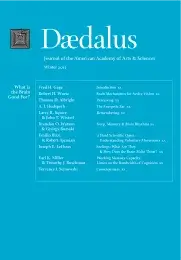Working Memory Capacity: Limits on the Bandwidth of Cognition
Why can your brain store a lifetime of experiences but process only a few thoughts at once? In this article we discuss “cognitive capacity” (the number of items that can be held “in mind” simultaneously) and suggest that the limit is inherent to processing based on oscillatory brain rhythms, or “brain waves,” which may regulate neural communication. Neurons that “hum” together temporarily “wire” together, allowing the brain to form and re-form networks on the fly, which may explain a hallmark of intelligence and cognition: mental flexibility. But this comes at a cost; only a small number of thoughts can fit into each wave. This explains why you should never talk on a mobile phone when driving.
Working memory holds the contents of our thoughts. It acts as a mental sketchpad, providing a surface on which we can place transitory information to hold it “in mind.” We can then “think” by manipulating this information, such as by combining it with other items or transforming it into something new. For example, working memory allows us to remember phone numbers, do mental arithmetic, and plan errands.
Given its fundamental role in thought it is surprising that working memory has such a severely limited capacity: we can only hold a few thoughts in our consciousness at once. In other words, the surface area of our mental sketchpad is quite small. This limitation is obvious whenever we try to multitask, such as when we attempt to talk on the phone while writing an email, and it is why using our mobile phones while driving increases accident risk, even if we are using a hands-free set.
This stands in contrast to other mental abilities that are not limited, such as long-term memory storage. We can store (seemingly) a lifetime of experiences, but, for some reason, we can only consciously express these thoughts a few at a time. This limited capacity may be fundamentally responsible for the cognitive architecture of our brains: researchers believe it to be the reason we have evolved the ability to focus on one thing at a time (to “attend” to something). Despite being well studied, no one has yet confirmed why working memory is limited. In this essay, we will review some of what is known about working memory capacity and offer our theory of why consciousness may have this limit. . . .
Access the full volume here.
